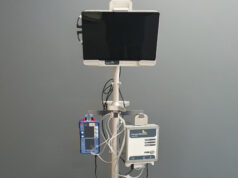
A prespecified primary analysis of the MOMENTUM 3 US IDE clinical study has indicated improvement in clinical outcomes for advanced heart failure patients implanted with a fully magnetically levitated centrifugal-flow pump (HeartMate 3 left ventricular assist system [LVAS], St Jude Medical) compared with patients implanted with an axial continuous-flow pump (HeartMate II LVAS, St Jude Medical).
The results of MOMENTUM 3 (The multicentre study of MagLev technology in patients undergoing mechanical circulatory support therapy with HeartMate 3) were recently published in The New England Journal of Medicine and were also presented by Mandeep R Mehra (medical director of Brigham and Women’s Hospital Heart and Vascular Center, Boston, USA) at a late-breaking clinical trial at the 2016 American Heart Association (AHA) scientific sessions (12–16 November, New Orleans, USA).
“A scarcity of effective therapeutic options for advanced heart failure has led to the development of durable mechanical circulatory support devices,” write Mehra et al. Despite the fact that left ventricular assist devices have been associated with improvement in survival and quality of life in advanced heart failure patients, they have been limited by “an increased risk of infection, bleeding, neurological events, and pump malfunction that is due principally to pump thrombosis,” the authors note.
Mehra et al point out that two reports published in 2013 suggested that there has been an increase in the risk of pump thrombosis associated with HeartMate II, and that a new pump, HeartMate 3, has been designed to “reduce shear stress on blood elements and avert pump thrombosis.” This new pump has “wide blood-flow passages and no mechanical bearings, is frictionless, and is programmed to facilitate rapid changes in rotor speed to create an intrinsic artificial pulse. This fixed pulse, which is asynchronous with the native heartbeat, reduces stasis in the pump,” the authors explain.
MOMENTUM 3 is a prospective, multicentre, randomised, unblinded study comparing the safety and effectiveness of the HeartMate 3 LVAS with the HeartMate II LVAS for the treatment of advanced, refractory, left ventricular heart failure. In a press release, St Jude Medical announced that more than 1,000 patients are being enrolled in this study and will be analysed in the long-term time point at two years.

In this analysis, Mehra et al reported the six-month follow-up of the first 294 patients assigned to the HeartMate 3 LVAS (n=152) and to the HeartMate II LVAS (n=142). The patients had advanced heart failure that was refractory to standard medical therapy and were eligible to LVAS therapy irrespective of whether the intended goal of pump support was bridge-to-transplantation or destination therapy.
The investigators reported that the primary endpoint, defined as event-free survival at six months with freedom from disabling stroke and reoperation to repair or replace the device, was achieved in a higher percentage of patients in the HeartMate 3 LVAS group (86.2%) than in the HeartMate II LVAS group (76.8%). “These results established both the non-inferiority of the centrifugal-flow pump to the axial-flow pump (absolute difference, 9.4 percentage points; 95 lower confidence boundary, -2.1; p<0.001 for non-inferiority) and its superiority (hazard ratio, 0.55; 95% confidence interval 0.32 to 0.95; two-tailed p=0.04 for superiority),” Mehra et al highlight.
Additionally, there were no pump thrombosis events reported in patients who were implanted with the HeartMate 3 LVAS at six months compared with 18 events reported in 14 patients (10.1%) implanted with the HeartMate II LVAS. There were no significant differences in the rates of death or disabling stroke between both groups; however, the investigators note, the rate for pump malfunction was “significantly lower” in the HeartMate 3 LVAS group with only one case reported. In the HeartMate II LVAS group, 11 patients underwent either a device exchange (n=9) or device removal with urgent transplantation (n=2).
In conclusion, Mehra et al write, “we found evidence of incremental improvement in clinical outcomes with the centrifugal-flow pump (HeartMate 3 LVAS) that was attributable to a lower rate of reoperation for pump malfunction without an apparent between-group difference in the rate of other adverse events.”
The HeartMate 3 LVAS is limited by federal law to investigational use in the United States.












